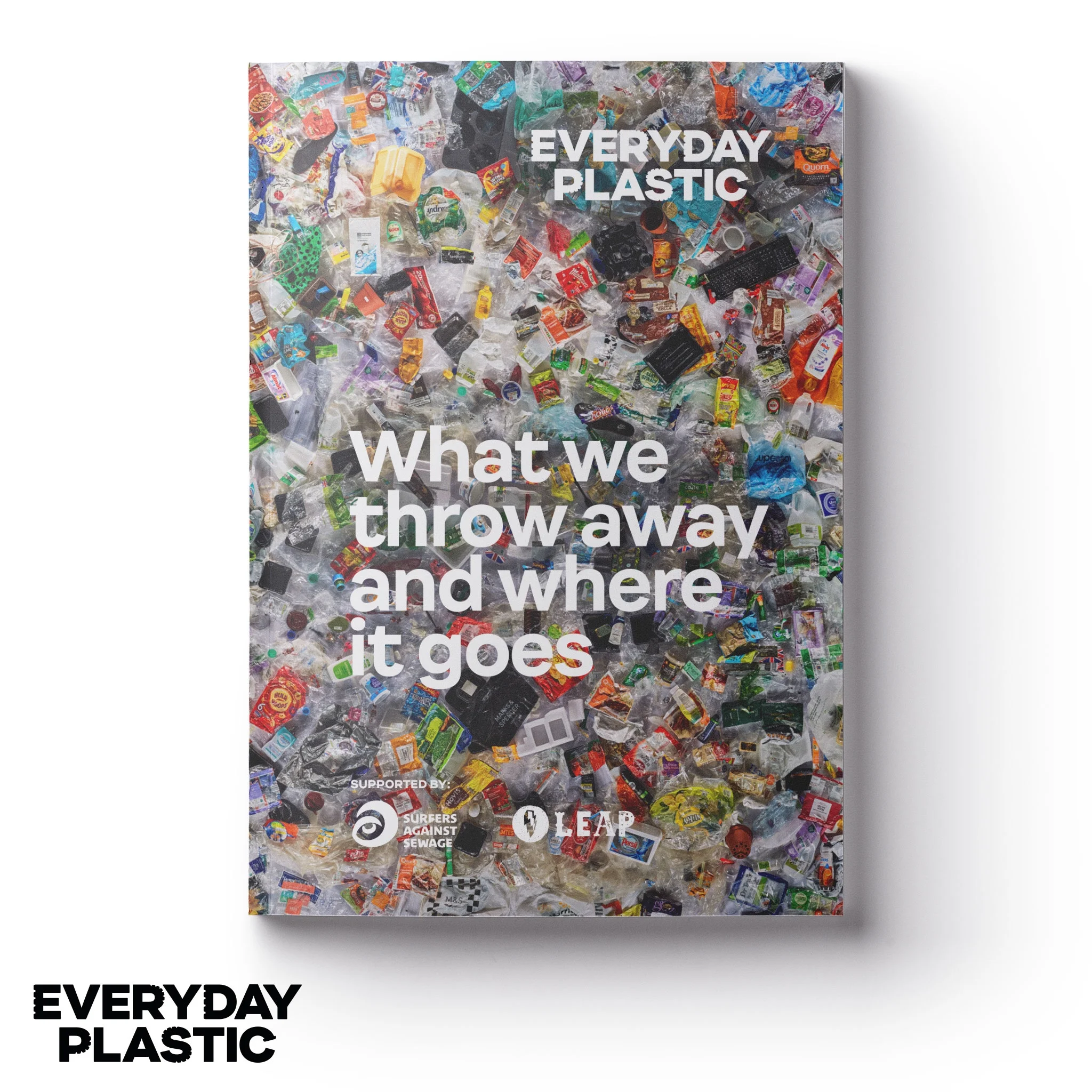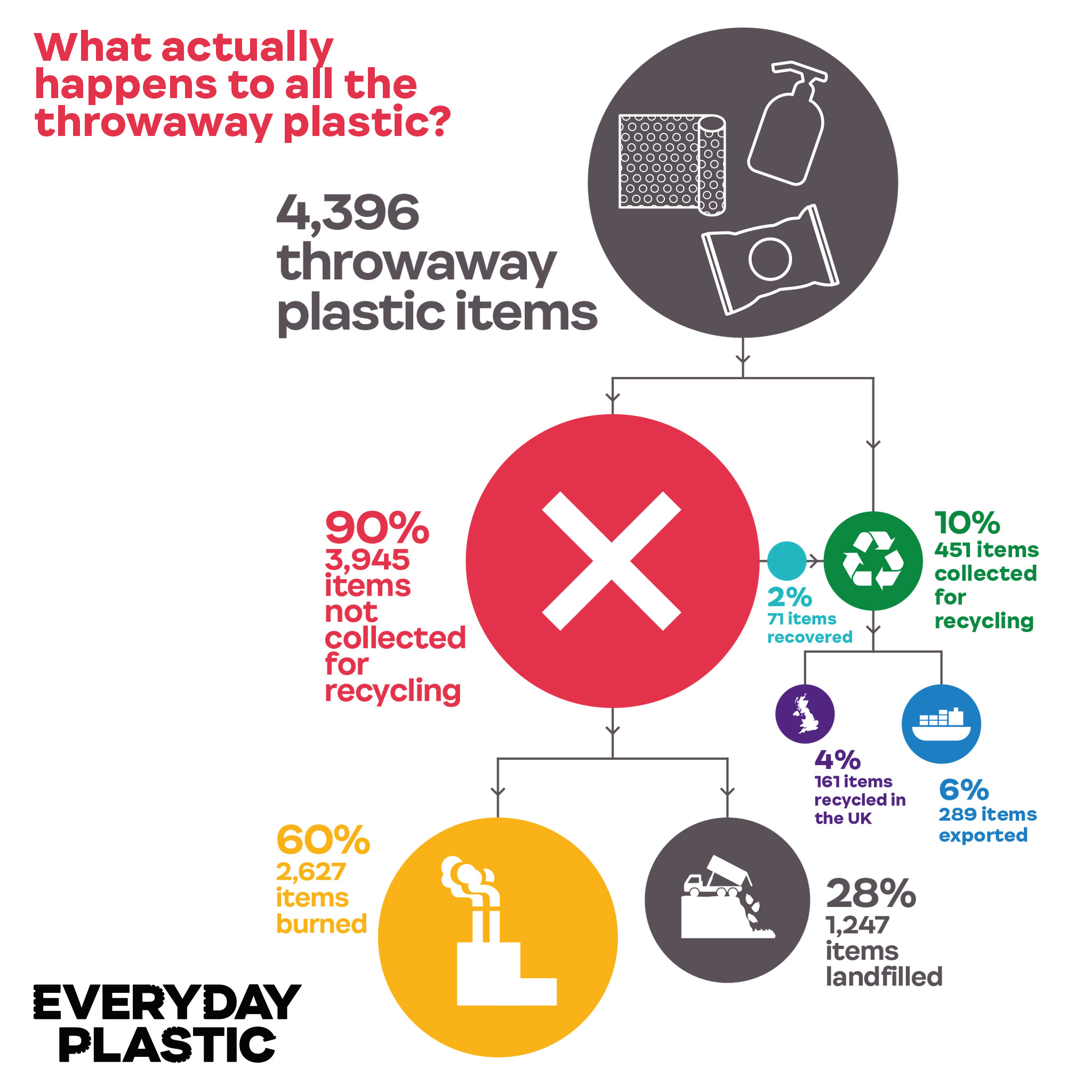We currently receive no regular funding and can only continue this project through the generous support of people like you. To donate to the Everyday Plastic project, please click here.
What we throw away and where it goes
This new report endorsed by a major environmental organisation estimates that the UK population throws away over 295 BILLION pieces of plastic every year.
In a unique personal experiment, Daniel Webb decided to store all the plastic waste he threw in the bin for 12 months. Shortly after moving to Margate on the Kent coast in 2016, he quickly learned that he was not provided with a recycling service at his flat.
Motivated by plastic pollution and wanting to dig deeper into murky national recycling figures, he launched a personal investigation to understand exactly what he throws away and where it ends up.
In a Nutshell…
Need fast stats? Looking for a bitesize report? Download In a Nutshell for a whistle-stop tour of the report’s key findings, including:
- Over the course of one year, Daniel threw away 4,490 pieces of plastic
- The UK throws away over 295 billion pieces of plastic every year
- 93% of his collected plastic waste was single-use packaging
- 67% of Webb’s throwaway plastic was used to package, wrap and consume food
- 70% of the plastic that Daniel threw away in a year is not currently recyclable
- Only 4% of Webb’s collection of plastic waste would be recycled at UK recycling facilities
These images are free to download and share. Download the media pack for hi-res versions. Please credit Everyday Plastic in every use. Infographics by Leap
Are we being lied to about recycling?
One year of throwing away 4,490 pieces of plastic waste made me stop and re-think. Recycling is a smokescreen. To make it work, we have to massively improve and invest in infrastructure, but also significantly reduce what we produce and use. Recycling is not and never will be the sole solution.
It’s amazing how your mindset can change over the course of a year and this hugely personal and exploratory journey has revealed a very unfortunate truth…
We are not being told the truth about recycling.
Donate
This report is 100% independent and the data collection, research, analysis and writing has been completed in our free time without external interests or funding.
Surfers Against Sewage is supporting the release and promotion of the report and have contributed funding to the design. The report has been designed by Leap as part of their people and planet ‘design for change’ initiative.
Julie and I have voluntarily worked on this paper for over 6 months. We would like to continue to work on providing real-time statistics and stories to improve our understanding and knowledge of where plastic goes when we throw it away.
If you read this report or use the content within it, please consider making a donation. Thank you.
HUGE thank you to our supporters
Surfers Against Sewage
Surfers Against Sewage is a national marine conservation and campaigning charity that inspires, unites and empowers communities to take action to protect oceans, beaches, waves and wildlife. Surfers Against Sewage has the support of thousands of members across the UK. Together, they speak out for the protection of the coastal environment – your oceans, waves and beaches.
Join a Plastic Free Community today
Leap
Leap is an eco-design studio housing a hub of talented creatives and associates who use their specialised skills in design, branding and web as tools for positive change for people, planet and profit. As well as changing the world through design, Leap takes pride in a carbon-neutral hosting service created with care to green up the web one website at a time.
How did we work it out?
To collect the data presented in this report, the first task was to classify the collection by purpose, plastic type and recyclability. To do so, we needed the help of 20 volunteers.
We have applied publicly available statistics to the data collected in this experiment. This has given us the means to make accurate calculations into the fate of my plastic within the UK waste system as well as energy and resource consumption related to the lifecycle of my plastic.
To see all the data collected and detail of calculations on our appendix page.





































